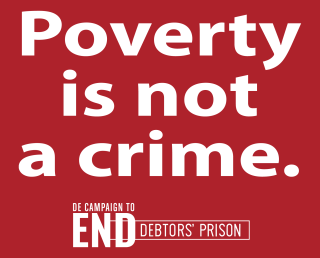
A fine is a monetary sanction imposed on an individual for committing a crime. Fines are punitive and related to the crime committed.
A fee is unrelated to the crime committed. It is a hidden tax intended to raise revenue for our government. In Delaware, some fees go to pay for the criminal justice system, itself, and others go to completely unrelated government services.
In our current Delaware system, the addition of fees to a criminal fine can more than double an individual’s financial liability. Largely because of fees, even small misdemeanors can result in hundreds of dollars in total court costs for defendants.
This is significant given that 85% of criminal defendants in our state are legally indigent. The result can be a vicious spiral of compounded poverty, subsequent arrests, and collateral consequences.
Myth: We need fines and fees to deter people from committing crimes.
Fact: Fines and fees can make people more likely to engage in criminal behavior.
A 2018 study of over 1,000 criminal defendants in Alabama found that 38.3% committed additional crimes to earn the money to pay off their fines and fees.
Myth: We need fines and fees to raise money for vital government services.
Fact: Fines and fees are an extremely inefficient way to raise revenue because they target people who can't pay.
The Fines and Fees Justice Center calls fines and fees an “unreliable and harmful form of taxation” that is “largely imposed in a way that those with the lowest economic means shoulder the highest costs. People of color and lower-income earners make up the largest portions of those in the justice system, far exceeding their percentage of the general population.” Moreover, “[c]reating budgets and programs that are dependent on arrests and convictions is literally banking on crime. If crime goes down, so does the revenue needed to fund the government.” Read the following December13, 2022, article from the Fines and Fees Justice Center.
”Assessments & Surcharges: A 50-State Survey of Supplemental Fees”
A 2019 study by the Brennan Center found that governments in three states spent $41 to collect every $100 in fines and fees, while the IRS spent only $0.34 to collect every $100 in taxes. Additionally, fines and fees ultimately shrink the state’s tax base by making it harder for many to work and overcome poverty.
Myth: Fines and fees are used as restitution for crime victims.
Fact: Victim’s restitution is an entirely separate cost, unrelated to fines and fees.
Defendants can be forced to pay hundreds of dollars in fines and fees that go purely toward the state’s general revenue fund, as well as funding court costs, court security, first-responder services, etc. This revenue can be more efficiently and effectively funded through means other than court-imposed fines and fees. The Victims' Compensation Fund Fee does go to a fund that can be distributed later to victims of crime, but the fund is unavailable to most victims of crimes in Delaware (victims of property crimes are ineligible for relief). Restitution would be unaffected by the reforms we espouse.